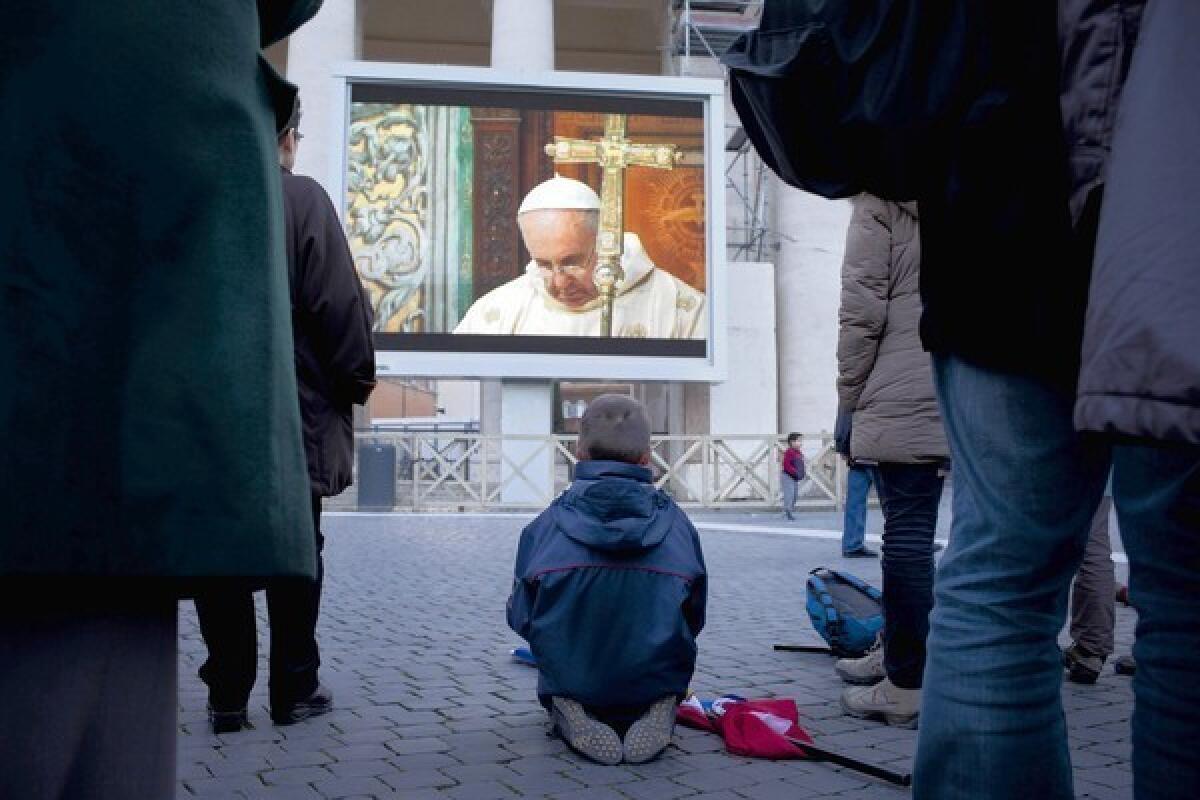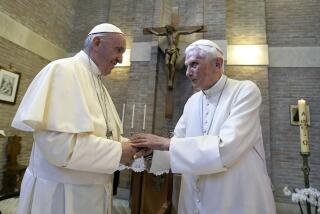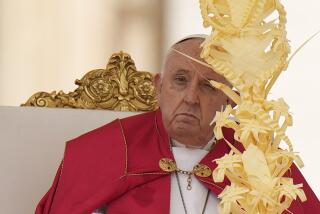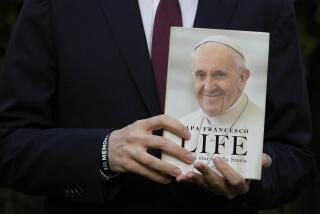Pope Francis’ age not seen as negative factor

VATICAN CITY — Before flying to Rome a few weeks ago to help choose a new pope, Cardinal Jorge Mario Bergoglio of Argentina brushed aside the idea that he might be the one picked to ascend the throne of St. Peter.
“I have no chance of being pope,” he told a columnist for the Argentine newspaper La Nacion. “My age counts against me this time.”
Many thought the 76-year-old archbishop of Buenos Aires was correct in his assessment. But he awoke Thursday as Pope Francis, to begin a pontificate that has already raised questions about how long it can last, what he has the vigor and time to accomplish and whether the Roman Catholic Church has not simply set itself up for another debilitating crisis at the top in the near future.
Twice already in the last decade, the church has been thrown into a tailspin of heartache and turmoil because of its leader’s advanced age.
First came the painful, and visible, decline of John Paul II, whose death in 2005 after an extended illness wrenched devotees with grief. Last month his successor, Benedict XVI stunned the world by announcing that, at 85, he was too old and tired to continue leading the flock, becoming the first pontiff in six centuries to abdicate.
Yet prelates and analysts alike said Thursday that age was not a factor — at least not a negative one — in the election of Bergoglio, the first occupant of the Holy See to come from the Americas and the first non-European to hold the post in 1,300 years.
Although he is well past the usual retirement age, reportedly doesn’t like to travel and has only one lung because of a long-ago illness, Francis has the opportunity to put his personal stamp on the church, reform its sclerotic bureaucracy and set it on a new path, even if his papacy turns out to be a short one.
“He’s able to do a lot in a little time,” Brazilian Cardinal Geraldo Majella Agnelo said, noting that there were prelates in their 50s and 60s in the conclave who could have been chosen if age had been a major concern. “I believe he will make a very vibrant witness to the world.”
The balding, bespectacled Francis appears outwardly to be in good health. He speaks softly, as was evident Thursday at a special Mass for cardinals in the Sistine Chapel. But it was unclear whether that stems from his humble personality or from having lost a lung as a young man in his early 20s, a condition that doctors say is unlikely to hamper the new pope.
“People who have spent their entire life living with one lung usually accommodate to it extremely well,” said Dr. Richard Shemin, chief of cardiothoracic surgery at Ronald Reagan UCLA Medical Center. “That’s assuming they don’t smoke and do everything they can to not have environmental factors destroy their good lung.”
There is no doubt that the pressure and burdens of heading a troubled global institution with 1.2 billion followers can accelerate the aging process. Americans often detect a similar effect on their presidents, and Benedict’s infirmity became especially pronounced in recent years. The pope emeritus was 78 when he assumed the mantle of Holy Father.
But “the cardinals clearly thought [Bergoglio] is up to the job. They would not have elected a frail or sick man after the Benedict resignation,” said John Thavis, a veteran Vatican watcher and author of the recently published book “The Vatican Diaries.”
“Bergoglio is 76 but looks younger. He has a great vocation of duty and an enviable capacity to work,” wrote Joaquin Morales Sola, the columnist for La Nacion who interviewed the then-archbishop of Buenos Aires before his departure for Rome. “No challenge ever discourages him.”
Plenty of challenges, and of a different magnitude, confront him now that he is pope.
Though growing in Africa and Asia, the Catholic Church continues to shed members in Europe, its home soil. In Latin America, aggressive outreach by evangelical Protestant sects is steadily eroding the church’s longtime preeminence.
The Vatican administration is beset with problems and scandals, including clerical sex abuse and the damaging leaks last year of private papal correspondence.
Whether any of the cardinals cast their ballots for Bergoglio in hope of electing just a transitional pontiff, one with the time and energy for only gentle, limited reforms, is not yet known.
Such a calculation would in any case be risky. There is recent (at least in Vatican terms) precedent of an elderly pope taking charge and shaking up the church: John XXIII, who took office in 1958 at age 77. By the time of his death just five years later, he had transformed Catholicism.
“He was elected to be a transitional pope. Three years after the election, he called the Second Vatican Council, which nobody expected, and he reconfigured the style of being pope,” said Massimo Faggioli, an expert on modern Christianity at the University of St. Thomas in Minnesota.
The Second Vatican Council resulted in modernizing reforms for the church, including the introduction of Mass in the vernacular rather than in Latin. Some of the changes sparked by John XXIII remain controversial to this day.
“He didn’t wait, because he knew he didn’t have much time,” Faggioli said. “Being 77 55 years ago was much older than 76 now.... There are reasons to expect, even in a short period of time, changes or surprises from this pope.”
Whether Francis has either the inclination or the stamina for the same kind of globe-trotting that one of his more recent predecessors, John Paul II, practiced — and enjoyed — remains to be seen. But constant travel is not necessarily a requirement for an effective papacy.
“He can be more open to global Catholicism by using other tools — for example, by giving more representation to non-European churches … [and] bringing people to Rome to tell Rome what Rome doesn’t want to hear,” Faggioli said.
In fact, John Paul II’s relative youthfulness upon being named pope — he was 58 — and his 26 1/2 -year tenure may have made many cardinals leery of installing anyone too young at the top. When the name of Philippine Cardinal Luis Antonio Tagle, who is 55, began surfacing as a papal contender, some prelates reportedly joked that they were looking for “a Holy Father, not an Eternal Father.”
Some of Francis’ effectiveness will depend on those he appoints as his close aides; a younger, more robust man as secretary of state, a prime minister-like post in the Vatican administration, could be key.
But even for a man his age, Francis’ propensity for hard work and his reputation for competent leadership in Buenos Aires should not be underestimated, some say.
“Argentina is a tough school. And he’s done well there,” said Cardinal George Pell of Australia.
“He isn’t young,” said Edimilson Lima, a priest at San Roberto Bellarmino in Rome, which was Bergoglio’s titular church as a cardinal before his elevation as pope. “But he appears to me to be full of energy and strength to carry on the work of the church.”
Times staff writers Tracy Wilkinson at Vatican City, Janet Stobart in Rome and Monte Morin in Los Angeles contributed to this report.
More to Read
Start your day right
Sign up for Essential California for news, features and recommendations from the L.A. Times and beyond in your inbox six days a week.
You may occasionally receive promotional content from the Los Angeles Times.







